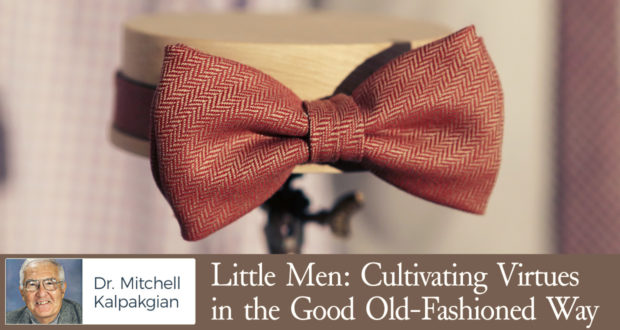This article is part of a series on Favorite Characters in Literature. We hope that it may inspire children and adults alike to become acquainted, or re-acquainted, with some of the classics of English literature.
All good parents are teachers, and all good teachers have the virtues of good parents. The founders of Plumfield Academy, Father and Mother Bhaer incorporate all the virtues of family life into their school and govern with both motherly love and fatherly discipline.
The academy is a humble place with simple educational principles and Christian ideals that produces an extraordinary education. Mother Bhaer (known familiarly as Mrs. Jo) calls Plumfield an “odd” school because it is not the typical finishing school of the day or a prestigious academy for the affluent.
On the contrary, the education at Plumfield Academy is most traditional, based on “cultivating virtues in the good old-fashioned way,” devoted to forming character in the young by instilling “manners and morals,” and concentrating on the development of the whole person, not merely academic achievements in mathematics, Latin, and Greek.
In Mrs. Jo’s words, she aspires only to teach “the few simple things” that will make a difference in the lives of her students like “self-knowledge, self-help, and self-control.”
The Nicest Place
Students who attend find nothing fancy but find the atmosphere and spirit of the school attractive. Nat, a new boy, is greeted with kindness and friendliness by the other students. He sees groups of students throughout the school engaged in favorite hobbies or recreations from cricket to flute-playing to tag to marbles.
Play abounds at Plumfield Academy and balances study. No one’s health or nerves suffer from immoderate study and lack of exercise. The life of learning is a joyful activity, not a grim chore. One boy tells Nat, “We have such good times here,” and a girl comments, “It’s the nicest place.”
Mrs. Jo explains to Nat that “we don’t believe in making children miserable by too many rules, and too much study.” The school respects the nature of children and demands only what is appropriate to their age. The school inculcates order, discipline, and duty, but the rules are not rigid or repressive.
The balance of work and play and of study and relaxation creates a happy atmosphere of learning in which children not only do good but “love to be good.”
Moral Deepening
While Plumfield Academy is not exclusive or selective or suitable only for the talented and gifted or for the socially prominent and affluent, it has high moral ideals and academic expectations of its students.
Mrs. Jo keeps a “Conscience Book” that reviews weekly the conduct of her pupils and measures their progress in conquering bad habits and in demonstrating self-denial, patience, perseverance, and kindness.
Mrs. Jo orders Sunday to be a special time, both a day of worship and prayer and a time of freedom and leisure. It is a time to write letters home, to pay visits, to take long walks, and “to see and love the providence of God in the beautiful miracles which Nature was working before their eyes.”
As loving teachers who also see their work as governing a family with both justice and mercy, the Bhaers address all the moral failings and bad habits of the students. The Bhaers compare themselves as teachers to gardeners who sow good seed, pull out weeds, tend the tender crops, and hope for a fruitful harvest. They do not settle for mediocrity, sloth, dishonesty, or bad manners.
Training in Maturity
When Nat’s habit of lying persists, Father Bhaer corrects him with an unforgettable lesson: “See, now, when you tell a lie I will not punish you, but you will punish me.” He tells Nat that every time he utters lies, “You shall ferrule me in the good old-fashioned way.”
The thought of striking the kind Father Bhaer motivates Nat to stop because of love rather than fear. When Dan does not control his bad habits of violating rules and brings the temptations of the world into the school—cigars, drinking, and swearing—he is dismissed after a cigar sets fire to the bed.
Mrs. Jo punishes the rowdy boys who spoiled Daisy’s elegant ball and ridiculed the formality of the event. They dressed inappropriately on purpose, avoided dancing, and treated food as a plaything. In a rare display of anger, she punishes the boys’ bad manners, explaining “I don’t like fun that makes other people unhappy.”
The offenders are forbidden any association with the girls until further notice. Boys and girls are expected to act like gentlemen and ladies.
Chivalry and Appreciation
The Bhaers also know the social nature of education, the importance of friendships that exert good influences. They encourage relationships where students’ different interests or opposing natures benefit from each other.
Demi the reader awakens in Dan the outdoorsman an interest books, and Dan the lover of horses and animals introduces Demi to the “wonderful tales of birds, and bees, and leaves, and animals.”
The Tomboyish Nan leads the “Bettyish” Daisy out of house and kitchen into the invigorating exercise of outdoor play, and the proper and domestic Daisy teaches the wild Nan how to look, act, and dress in a more feminine way and be at home in the kitchen.
Plumfield Academy is a coeducational school so girls can awaken the chivalry in boys and the boys learn to appreciate the feminine nature “with a tender sort of reverence.”
That is Everything
Plumfield Academy, then, proposes no elaborate curriculum or boasts of famous accomplishments of its students. It offers a modest curriculum of reading, writing, and arithmetic integrated with athletics, music, drama, fun, social graces, and Christian virtues.
Mrs. Jo summarizes her educational philosophy: “I only want to give these students the few simple things which will help to make life less hard to them when they go out to fight their battles in the world. Honesty, courage, industry, faith in God, their fellow-creatures, and themselves.”
While these ideals do not look extraordinary, Father Bhaer recognizes the achievement: “That is everything.” In schools as in farming small seeds can produce an abundant harvest.
At the beginning of the book, Father Bhaer tells a story about a gardener who nurtured all the young plants with tender care as he waited for the season of harvest. Once the children detect that they are the gardens and Father Bhaer the gardener, they listen with fascination. The gardener then plants different flowers: perseverance for Franz, steadiness for Tommy, industriousness for Daisy, wisdom for Demi, and generosity for all who request it.
As the whole school celebrates Thanksgiving in the final chapter of the book, the students contribute food from their gardens—a feast that offers thanks for both the bounty of the field and the fruitfulness of education inspired by a love of goodness and love of children.
After performing skits, dances, and a rendition of Cinderella, all the students form a circle. Holding hands and dancing around Father and Mother Bhaer, they sing words of praise:
Best of all the harvest
In the dear God’s sight,
Are the happy children
In the home tonight;
And we come to offer
Thanks where thanks are due,
With grateful hearts and voices,
Father, mother unto you.
The Best of Gardeners
The Bhaers as parents and teachers are the best of gardeners because they cooperate with God and Mother Nature in the work of education, bringing out the potential for goodness and excellence in each student. They respect the human nature of all the children, the particular nature of the boys and the special nature of the girls, and the individual, unique nature of each child. They expect the best, not the impossible; they have ideal ideals but realistic expectations.
They teach the tried and true and trust the traditional, never infatuated with fads. They punish and they forgive, never losing hope or patience. For all their work as gardeners of children they receive the abundant harvest of seeing ordinary boys and girls bloom into Little Men and Little Women.
As the final lines of Little Men conclude, the story of the good parent, teacher, and farmer is the same: “For love is a flower that grows in any soil, works its sweet miracles undaunted by autumn frost or winter snow, blooming fair and fragrant all the year, and blessing those who give and those who receive.”

 Seton Magazine Catholic Homeschool Articles, Advice & Resources
Seton Magazine Catholic Homeschool Articles, Advice & Resources










































